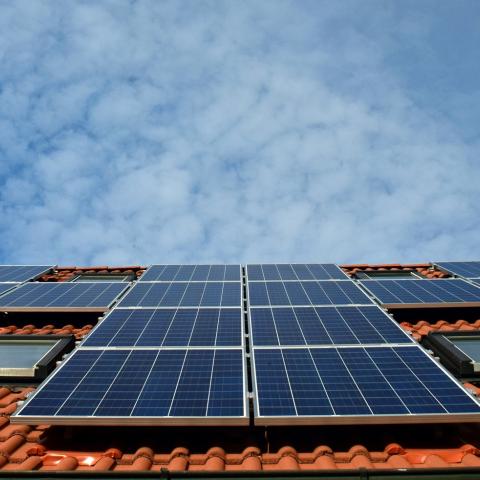
SOLAR TYPES & CHOICES
SOLAR TYPES & CHOICES
There are 3 main types of solar PV systems:
- Grid-tied solar system
- Hybrid, solar system with battery storage & Grid connection
- Off grid, stand alone power system
Each type of solar panel system has their advantages and disadvantages and it really comes down to what the customer wants to gain from their solar panel installation.
Grid-Tied Solar System
Grid-tied solar systems are utility-interactive, this system is connected directly to the National Grid. This is the most common amongst home and business owners.
This system is perfect for someone who is already connected to the Grid, yet wants to reduce their Carbon footprint and energy bills.
An on-grid solar system doesn’t require a battery storage system, and is connected to the National grid directly via a Solar or micro inverter. As the solar panels convert sunlight into energy, your home uses this green energy supply to power your appliances. When you generate any excess solar energy, this electricity is exported back to the Grid. A key advantage of an on grid system is that your energy supply will always be supported by the National Grid.
One of the disadvantages of this type of system is that because it uses a grid-tied inverter, when the National Grid fails, so does your solar system. This means that you wouldn’t have any source of back up power. However, there’s no need to worry if you have an on-grid solar system, it can be upgraded to a hybrid system by adding an additional battery at any time. This is known as retro fitting and requires installing an AC coupled control management system alongside the battery of your choice. Adding battery storage to your Solar PV system can provide you with solar power even during such outages. This is known as a Hybrid System.
Hybrid Solar System
Hybrid solar systems combine the technology of Solar Panels and Solar batteries to create a green energy solution which provides a back up supply of energy. Although a hybrid PV system remains connected to the National Grid, any solar energy generated is first stored in a home battery system before going to the grid.
The main advantage of a hybrid solar system is that by storing your surplus energy in a battery, you can use your solar energy to power your home during the night, and will export less energy back to the Grid. Whats more, unlike an on-grid system, when the National Grid is down, you can also draw energy from your battery supply. This is known as ‘islanding’, and is particularly ideal for property who live in areas prone to power outages.
Hybrid solar panel systems offer great flexibility, as when you have used up all the energy in your battery, you still have the ability to draw from the Grid. This makes a hybrid solar system the perfect in-between solution, As an in-between solution, a hybrid solar system is more budget friendly compared to an off grid system, however is more expensive than an on grid system. A huge advantage of a hybrid system is that you can expand your battery storage system at any time and because you are still connected to the grid you can also charge your batteries at cheap off-peak times. However, because there are more components involved in a hybrid solar system, it is less efficient compared to a grid-tied system.
Off-Grid Solar System
Unlike an on-grid solar system an off-grid system has zero ties to the National Grid, making it desirable for those who can’t connect to the grid easily or who wish to be energy independent.
With energy prices rising, energy independence is more in demand than ever. A complete Off-Grid Solar System contains everything you need to generate your own solar energy. Unlike hybrid systems, Off-grid systems tend to feature back up generators and other types of renewable sources (such as Wind energy) to ensure your battery is fully charged all year round. This is because your off-grid system is the only means of energy supply you have. Off-grid systems have the ability to provide electricity even in the remotest of locations. Through an off-grid solar system you can be energy self-sufficient, with a supply of power, no matter where you decide to live.
The benefits of an off-grid system include having no energy bill, as well as the ability to rely only on environmentally friendly resources.
As off-grid solar systems require more components, they are naturally more expensive than a standard grid-tied system. However as off-grid systems are modular, you can grow your system to meet your energy requirements at any given time.
